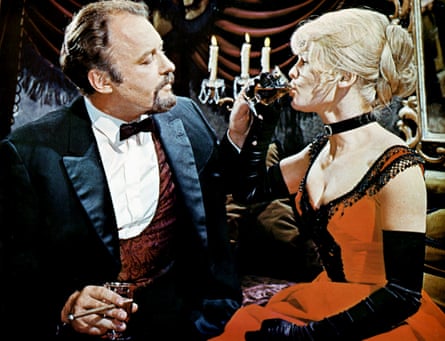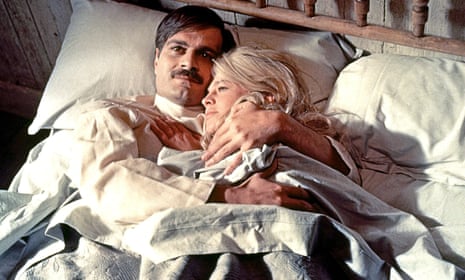Doctor Zhivago barely figured on my radar at a time when I was more interested in James Bond and the Beatles than romance, and I never caught up with it. A Passage to India, the first David Lean film I saw on a big screen, featured Alec Guinness in blackface, which was enough to put anyone off. I liked Brief Encounter and Lean’s Dickens adaptations, and a late-1980s screening of Lawrence of Arabia in 70mm was, of course, stunning, but I’d never been chomping at the bit to fill in those Lean gaps in my viewing.
So what better time than lockdown for 200 minutes of comfort bingeing on one of the top 10 highest-grossing films (adjusted for inflation) of all time? Star-crossed lovers shivering under furs in an epic romance against a backdrop of Russian revolution? I anticipate the political sweep of Reds combined with the romantic tragedy of The English Patient. I won’t even mind if it’s a bit slushy. What can possibly go wrong?
Doctor Zhivago begins and I stare for what feels like hours at the word OVERTURE while Maurice Jarre’s Oscar-winning, balalaika-heavy score reminds me how Lara’s Theme has always set my teeth on edge. Things pick up when Alec Guinness as Zhivago’s brother, a post-war USSR apparatchik searching for his niece, says: “There were children in those days who lived off human flesh.”
And then we plunge into a three-hour flashback, and it’s downhill all the way, with a complete absence of cannibal children. Whose story is this? Guinness narrates, but we see a great many events to which his character isn’t privy, and the point of view bops from Zhivago (Omar Sharif), to Lara (Julie Christie with 1960s hair) to her fiance (Tom Courtenay). I haven’t read Boris Pasternak’s novel, but I’m sorry, I don’t think Robert Bolt did a very good job of adapting it, even if it did win him an Academy award.
But Lean is good at crowd scenes. The film perks up when sabre-wielding cossacks scythe into peaceful working-class demonstrators, and later, during the first world war, when Russian soldiers on their way to the front rebel against their officers. Meanwhile, back in Moscow, Zhivago and his wife (Geraldine Chaplin) and father-in-law (Ralph Richardson) are forced to share their luxury pad with a bunch of plebs.
Luckily for the Zhivagos, and stopping only for the INTERMISSION, there is a limitless supply of shabby-chic rural cottages where they can lead lives of genteel toil, carrying baskets of potatoes, issuing state-of-the-revolution updates (“Oh Lord not another purge!”) and reading the paper (“They’ve shot the Tsar!”). And you can spend days travelling by train across Russia, but if you think this means you can get away from Rod Steiger (“I come from Moscow; I’m on my way to Vladivostok!”), you’ve got another think coming.
Thank God for Steiger; the drama stutters to life whenever he’s on screen. It has to say something about the general level of characterisation that the most compelling character is a venal wheeler-dealer who date-raped the heroine before forcing her to become his mistress.

Zhivago finds Lara living in the next village (small world!) and cheats on his wife. The lovers end up squatting in a frozen mansion, where he writes the poetry that will make him famous, while the viewer wonders whether the film shouldn’t have been retitled 101 Ways of Filming a Frosty Windowpane. But even the snow fails to convey a sense of cold; in fact the Russian weather, which famously did for Napoleon and Hitler, looks perfectly lovely. (Afterwards I read it was mostly filmed in Spain – not the obvious choice as a steppes surrogate – and the snow was marble dust from a nearby quarry. Let’s hope the extras didn’t inhale.)
At the end of the flashback, there’s a wannabe-Rosebud moment involving a balalaika which falls flat, since in 200 minutes we’ve never actually seen anyone playing it. But I realise a 29-inch television is not the ideal way to watch a blockbuster in which character and dialogue take a backseat to spectacle; alongside best adapted screenplay and score, Doctor Zhivago also won Academy awards for cinematography, art direction and costume design. Not a great lockdown movie, then. Probably better on the big screen – just like Twister.

Comments (…)
Sign in or create your Guardian account to join the discussion